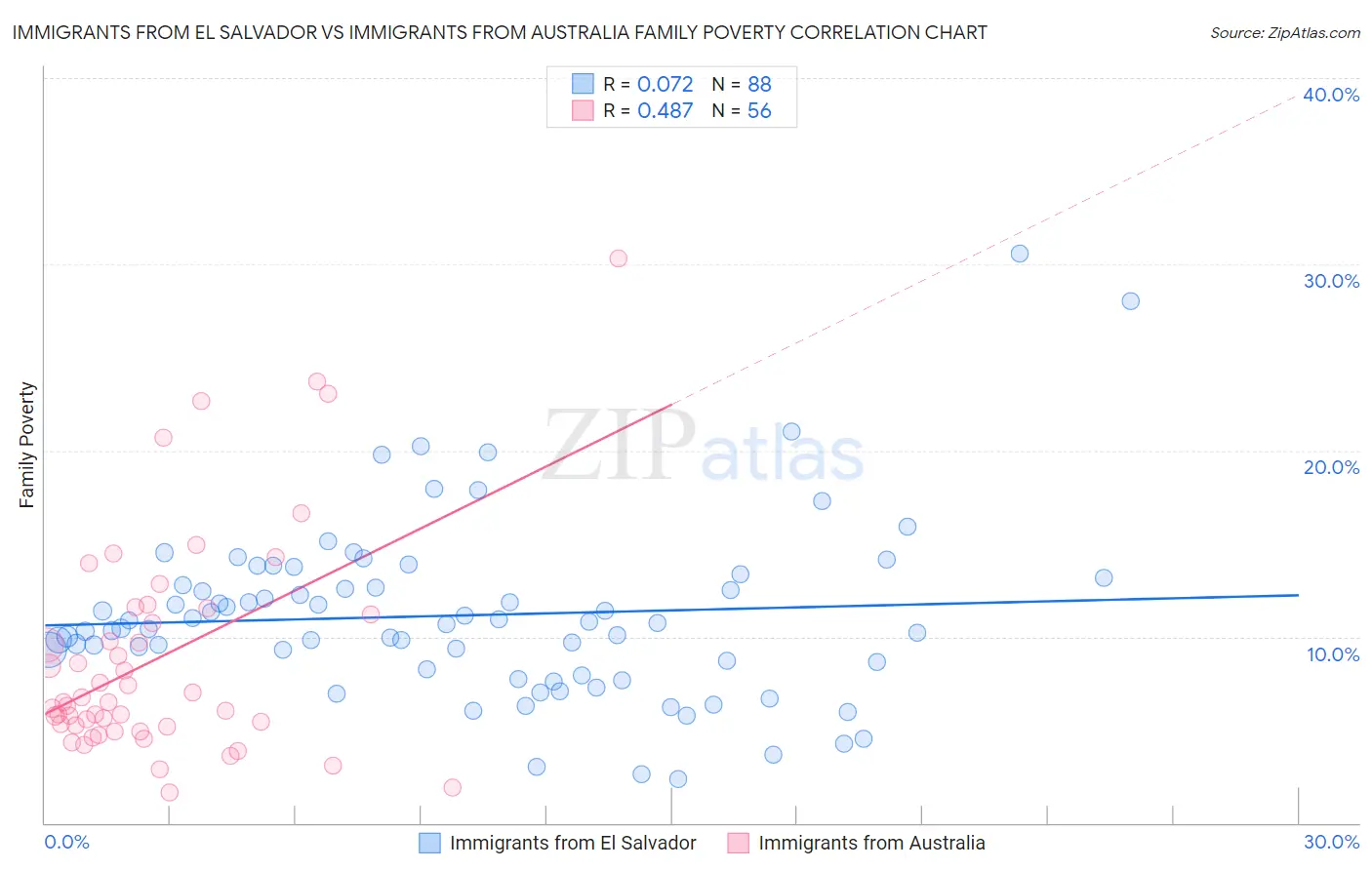Immigrants from El Salvador vs Immigrants from Australia Family Poverty
COMPARE
Immigrants from El Salvador
Immigrants from Australia
Family Poverty
Family Poverty Comparison
Immigrants from El Salvador
Immigrants from Australia
11.0%
FAMILY POVERTY
0.1/ 100
METRIC RATING
266th/ 347
METRIC RANK
7.6%
FAMILY POVERTY
99.2/ 100
METRIC RATING
41st/ 347
METRIC RANK
Immigrants from El Salvador vs Immigrants from Australia Family Poverty Correlation Chart
The statistical analysis conducted on geographies consisting of 357,239,196 people shows a slight positive correlation between the proportion of Immigrants from El Salvador and poverty level among families in the United States with a correlation coefficient (R) of 0.072 and weighted average of 11.0%. Similarly, the statistical analysis conducted on geographies consisting of 226,808,313 people shows a moderate positive correlation between the proportion of Immigrants from Australia and poverty level among families in the United States with a correlation coefficient (R) of 0.487 and weighted average of 7.6%, a difference of 46.0%.

Family Poverty Correlation Summary
| Measurement | Immigrants from El Salvador | Immigrants from Australia |
| Minimum | 2.4% | 1.7% |
| Maximum | 30.5% | 30.3% |
| Range | 28.2% | 28.6% |
| Mean | 11.1% | 8.9% |
| Median | 10.7% | 6.5% |
| Interquartile 25% (IQ1) | 8.4% | 5.2% |
| Interquartile 75% (IQ3) | 13.0% | 11.4% |
| Interquartile Range (IQR) | 4.5% | 6.2% |
| Standard Deviation (Sample) | 4.8% | 6.0% |
| Standard Deviation (Population) | 4.7% | 5.9% |
Similar Demographics by Family Poverty
Demographics Similar to Immigrants from El Salvador by Family Poverty
In terms of family poverty, the demographic groups most similar to Immigrants from El Salvador are Comanche (11.0%, a difference of 0.010%), Jamaican (11.1%, a difference of 0.12%), Immigrants from Ecuador (11.1%, a difference of 0.60%), Immigrants from Nicaragua (11.1%, a difference of 0.60%), and Immigrants from Bahamas (11.1%, a difference of 0.85%).
| Demographics | Rating | Rank | Family Poverty |
| Mexican American Indians | 0.2 /100 | #259 | Tragic 10.9% |
| Bangladeshis | 0.2 /100 | #260 | Tragic 10.9% |
| Shoshone | 0.2 /100 | #261 | Tragic 10.9% |
| Spanish American Indians | 0.2 /100 | #262 | Tragic 10.9% |
| Cape Verdeans | 0.1 /100 | #263 | Tragic 10.9% |
| Trinidadians and Tobagonians | 0.1 /100 | #264 | Tragic 10.9% |
| Immigrants | Trinidad and Tobago | 0.1 /100 | #265 | Tragic 10.9% |
| Immigrants | El Salvador | 0.1 /100 | #266 | Tragic 11.0% |
| Comanche | 0.1 /100 | #267 | Tragic 11.0% |
| Jamaicans | 0.1 /100 | #268 | Tragic 11.1% |
| Immigrants | Ecuador | 0.1 /100 | #269 | Tragic 11.1% |
| Immigrants | Nicaragua | 0.1 /100 | #270 | Tragic 11.1% |
| Immigrants | Bahamas | 0.1 /100 | #271 | Tragic 11.1% |
| Immigrants | Jamaica | 0.1 /100 | #272 | Tragic 11.2% |
| Somalis | 0.1 /100 | #273 | Tragic 11.2% |
Demographics Similar to Immigrants from Australia by Family Poverty
In terms of family poverty, the demographic groups most similar to Immigrants from Australia are Slovene (7.5%, a difference of 0.30%), Carpatho Rusyn (7.5%, a difference of 0.34%), Bolivian (7.5%, a difference of 0.40%), Scandinavian (7.6%, a difference of 0.63%), and Estonian (7.5%, a difference of 0.64%).
| Demographics | Rating | Rank | Family Poverty |
| Russians | 99.5 /100 | #34 | Exceptional 7.5% |
| Greeks | 99.4 /100 | #35 | Exceptional 7.5% |
| Turks | 99.4 /100 | #36 | Exceptional 7.5% |
| Estonians | 99.4 /100 | #37 | Exceptional 7.5% |
| Bolivians | 99.3 /100 | #38 | Exceptional 7.5% |
| Carpatho Rusyns | 99.3 /100 | #39 | Exceptional 7.5% |
| Slovenes | 99.3 /100 | #40 | Exceptional 7.5% |
| Immigrants | Australia | 99.2 /100 | #41 | Exceptional 7.6% |
| Scandinavians | 99.1 /100 | #42 | Exceptional 7.6% |
| Immigrants | Austria | 99.1 /100 | #43 | Exceptional 7.6% |
| Germans | 99.0 /100 | #44 | Exceptional 7.7% |
| Okinawans | 98.9 /100 | #45 | Exceptional 7.7% |
| Tongans | 98.9 /100 | #46 | Exceptional 7.7% |
| Immigrants | Czechoslovakia | 98.9 /100 | #47 | Exceptional 7.7% |
| Immigrants | Sri Lanka | 98.9 /100 | #48 | Exceptional 7.7% |